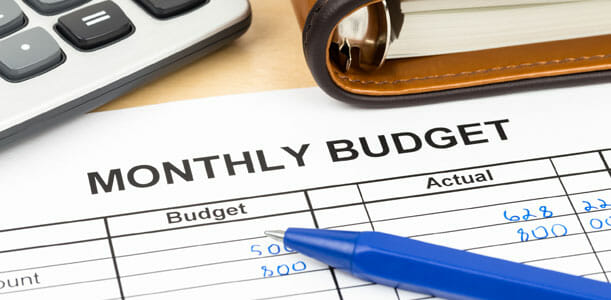
A simple budget can help you manage your money, make smart decisions, and plan for the future. Unfortunately, many people are never taught how to make one. The good news is that making a budget doesn’t have to be complicated.
Here are a few easy steps to create your basic monthly budget. When you know where your money is going, you can make smart changes and make progress toward financial goals, like paying off old debts.
1. Start With Your Major Expenses
Your first step is to create a list of your fixed monthly expenses. This gives you a baseline amount of money that you know you will have to spend.
These expenses might include:
- Rent or mortgage payment
- Health insurance
- Car payment
- School tuition
- Loan or debt payments
- Utilities like electricity, water, phone service, and internet access
Add up these expenses and subtract them from your monthly income. When you consider your finances, you can think of this money as already spent. For example, if you make $2,300 per month after taxes and these major expenses add up to $1,500, then you have $800 left over for everything else. Now you can start thinking about your more variable monthly expenses.
2. Budget for the Basics
Other than bills that stay the same every month, we all have regular expenses that might vary from month to month. For instance, you might spend $80 on gasoline in April and only $65 in May.
Take a look at your bank statements and receipts over the last few months to get an idea of how much you usually spend on the following:
- Groceries
- Restaurants, fast food, and coffee
- Transportation (fuel, public transportation, ridesharing)
- Entertainment
Did any of the totals surprise you? These variable expenses are where most people can make small changes to save money each month. You may not have control over your rent or housing expenses, but you do control whether you go out or stay in. For example, if you realize you tend to eat out on weekends, make a plan to stay in and cook more to save money.
If you want to reduce the amount you spend on coffee, for instance, give yourself a spending limit. If you spent $50 last month at coffee shops, challenge yourself to spend no more than $30 this month. A little less spent on entertainment or fast food frees up money in your budget to help you reach your financial goals.
3. Plan for the Future
Now that you’ve looked at your fixed monthly expenses and where you can cut back, take a moment to consider your ultimate financial goals. Do you want to get out of debt? Buy a house? Start a business? This is where you should channel the money you can save on things like eating out and entertainment. An extra $20 toward a past-due debt can help you get back on track faster and bring you a step closer to financial stability.
By taking a close look at how much you spend and what you spend it on, you can find ways to save and channel money toward your goals, like paying off debts. When you have concrete goals and a plan to achieve them, you’ve put yourself in a great position to succeed.
*Although we are a debt collector, we are providing these helpful tips because we care about consumers and their general financial well-being. Midland Credit Management does not offer financial advice. If you have questions or concerns about your personal finances, please speak to a financial advisor.